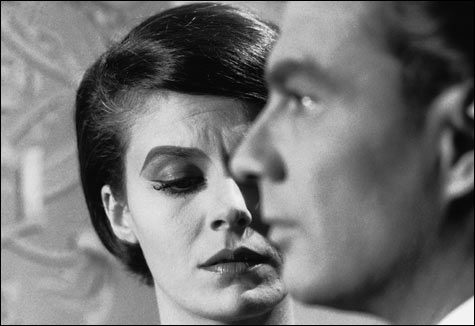
SALONS. DOORS. DOORS. SALONS. Welcome to the world of Alain Robbe-Grillet. |
| L’année dernière à marienbad|Last Year At Marienbad | Directed by Alain Resnais | Written by Alain Robbe-Grillet | with Delphine Seyrig, Giorgio Albertazzi, and Sacha Pitoëff | Rialto Pictures | French | 93 minutes | Brattle Theatre: February 29–March 6 |
Alain Resnais, perhaps as a dig at his screenwriter Alain Robbe-Grillet, sometimes tells a joke about their notorious 1961 movie. It seems a suspect picked up by the police told them as an alibi that he’d been at a screening of L’année dernière à Marienbad|Last Year at Marienbad. The police said, okay, tell us the plot. The suspect was stumped, so they arrested him.Robbe-Grillet, who died last week at the age of 85, probably would not have been offended, since the joke vindicates everything the film and all of his writing were trying to accomplish. As he demonstrated in novels like Les gommes (1953) and La jalousie (1957) and articulated in his 1963 collection of essays, Pour la nouvelle roman, he sought to eradicate such stuffy conventions as plot, character, and meaning and replace them with endless surfaces related in looping, repeated descriptions. As in “ . . . Empty salons. Corridors. Salons. Doors. Doors. Salons. Empty chairs, deep armchairs, thick carpets . . . ” — the incantatory voiceover refrain that introduces the viewer of Marienbad (which is at the Brattle all week) to the brittle, baroque luxuriousness of the sprawling hotel in which the story takes place.
Did I say story? Those conventions are hard to shake. It’s more like an equation that’s never solved. Although they are never named in the film (“Names don’t matter,” a nameless character says), the script labels the characters A, X, and M. X (Giorgio Albertazzi) keeps hitting on A (Delphine Seyrig), insisting (again and again, of course) that they met a year ago at Marienbad or someplace and made a vow to “leave” together. She says she doesn’t remember, tells him he’s crazy, tells him to go away. Over and over again. Pretty much the old “Haven’t I seen you somewhere before?” and “Come here often?” pick-up lines gone terribly awry.
Enter (repeatedly) M (Sacha Pitoëff), a sinister presence in a tuxedo, who keeps inviting other guests to play an ancient three-card monte kind of game (called, though not in the film of course, “misère nim”) that is impossible for him to lose. (“If you cannot lose,” notes a skeptical victim, “it isn’t a game.”) M terrifies A, so he is obviously her husband. I like to think of him, though, as Death, differing from Bergman’s version only in choice of game and couture.
Which brings us to what the hell the movie’s all about, meaning being another narrative convention tough to kill. Lately, I’ve been drawn to the Orpheus-and-Eurydice school of thought. The classical statues on the grounds that M insists are of Charles III and his wife seem more likely to represent the mythical lovers as they attempt to flee the Underworld. “They might as well be you and I,” X airily remarks. As with names, whether their hell is literal or existential or psychological probably doesn’t matter.